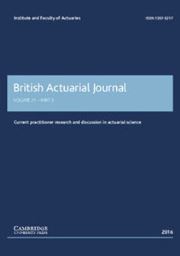On the evening of Monday 10 October 2011, Jane Curtis, President of the Institute and Faculty of Actuaries, presented Professor Angus Macdonald with the Finlaison Medal in recognition of his services to the actuarial profession, after the Autumn lecture delivered by Sir Harry Burns at The Scottish National Gallery, Edinburgh.
Angus Macdonald's qualifications include a BSc Mathematics (Glasgow) 1981, a PhD in Actuarial Science (Heriot-Watt) 1995 and he qualified as a Fellow of the Faculty of Actuaries in 1984.
Angus worked with Scottish Amicable until 1989, then joined the Department of Actuarial Mathematics and Statistics at Heriot-Watt University. He was appointed to Senior Lecturer in 1997, to Professor in 2000, and since 2007 he has been Head of Department. In 2006 he was elected as a Fellow of the Royal Society of Edinburgh.
Angus has served on Faculty Council; as Honorary Librarian; on QEC (and its predecessor ECPD Board); as Chair of the CMI Mortality Committee; on the Mortality Research Steering Committee and on various old-style Committees such as Research, Journals, Publications and Library. Angus has also been an examiner for the Profession has contributed to syllabus development and has acted as external examiner, independent examiner and PhD examiner at several universities.
Angus is the Director of the Genetics and Insurance Research Centre (GIRC) at Heriot-Watt set up in 1999 to carry out quantitative research into the financial implications of human genetics. GIRC's remit is to develop mathematical and actuarial models to estimate the costs of genetic knowledge to individuals, to insurers and to service providers. GIRC has pioneered research into genetics and insurance, covering among other topics adverse selection costs arising from single-gene and complex disorders, the implications for actuaries of small scale epidemiological studies and large-scale longitudinal studies, and links with economics.
Angus is probably the world leader in the implications for actuaries of the advances in human genetics in recent years. He has produced 39 papers in the last 12 years about genetics, often written jointly with research students or research associates in GIRC and has given talks worldwide. In 2005, two GIRC papers (co-written by Angus, Professor Howard Waters and Dr Chessman Wekwete) were awarded the David Garrick Halmstad Prize. In 2009 he was appointed to the short-lived Human Genetics Commission Monitoring Group on Genetics and Insurance.
Angus has been involved in the work of the CMI for many years including ten years as Chairman of the Mortality Committee, which, in his time, produced the “00 series” of mortality rates, initiated the CMI's recent research into mortality projection methods, and began the move to individual policy reporting for the mortality investigations. He is now Deputy Chairman of the CMI Executive Committee and Chairman of the Technical Committee.
Angus's earlier research was on life office solvency, which led him to write and place in the public domain the model office program “MO”, which was used by other researchers and by students' societies through the 1990s.
Angus's other main contribution to advancing actuarial science is through publications. He was an Editor of Scandinavian Actuarial Journal from 2000–2006, appointed by the Danish Society of Actuaries, and the section editor for life insurance and pensions of the Encyclopaedia of Actuarial Science (John Wiley, 1994). He was Chairman of the Journal Committee for some years and was the driving force behind the creation of Annals of Actuarial Science, of which he became the second Editor in 2008. In the same year he was appointed as one of the Series Editors for the International Series on Actuarial Science, published by Cambridge University Press in association with the profession.
Angus has also been heavily involved in the Maxwell Institute for Mathematical Sciences (part of the Edinburgh Research Partnership which pools all the research and postgraduate activities in the three mathematical sciences departments at Heriot-Watt University and the University of Edinburgh) and served as its first Director from 2005–2007.


